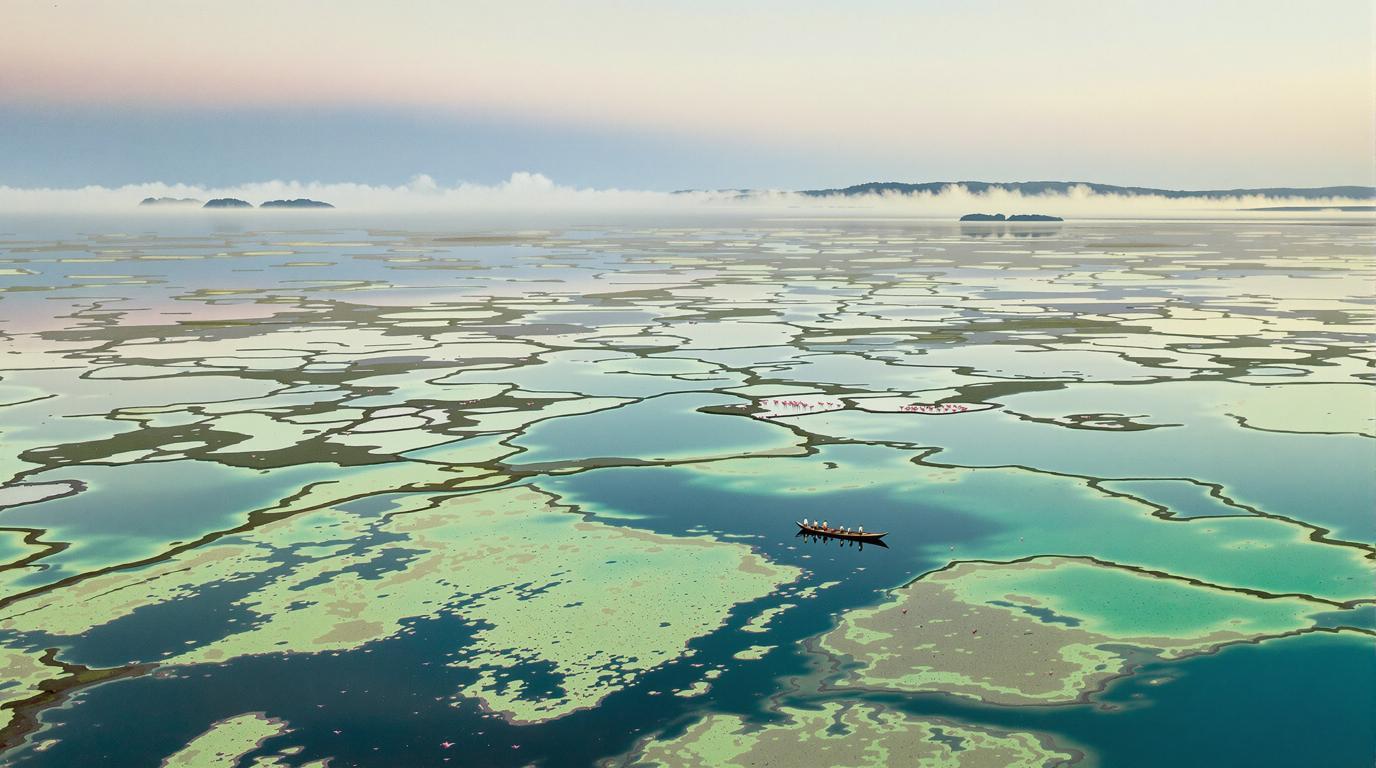The fishing pirogue glides across Lake Chad’s mirror-like surface as dawn breaks, revealing a kaleidoscope of pink flamingos taking flight against the amber horizon. Ibrahim, our Buduma guide, points to a distant island shrouded in morning mist. “My grandfather’s village stood there before the waters receded,” he explains, his weathered face reflecting generations of life intertwined with this shrinking ecological wonder. Few travelers venture to this remote corner where Chad, Niger, Cameroon, and Nigeria converge—leaving its treasures largely undiscovered.
Where desert meets wetland: the changing face of Africa’s ancient lake
What was once Africa’s sixth-largest freshwater lake has diminished to roughly 10% of its 1960s size, transforming Lake Chad into an intricate patchwork of shallow pools, wetlands, and emerging islands. Yet this environmental metamorphosis has created one of Africa’s most biologically diverse ecosystems—a critical stopover for millions of migratory birds and home to communities who have adapted to its fluctuating shorelines for centuries.
The lake sits within a vast depression that has served as a vital crossroads for trade since the 9th century. Ibrahim tells me, “We Buduma have always been the children of the water. When the lake changes, we change with it.” Their floating homes and papyrus boats represent just one of the cultural adaptations that make this region so distinct from other sacred lakes that conceal ancient cultural histories.
Discovering the unexpected treasures of a vanishing landscape
The floating markets of Bol Peninsula
Just after sunrise, dozens of wooden canoes converge at Bol’s floating market, where Buduma fishermen display their night’s catch alongside women selling vegetables grown in the lake’s fertile polders. Unlike the tourist-oriented markets elsewhere in Africa, this is commerce in its most authentic form—no souvenirs, just sustenance.
Fishermen expertly fillet massive Nile perch while haggling in Kanembou dialect, offering pieces to visitors to sample raw. The air fills with the earthy scent of smoked fish being prepared in traditional clay ovens that dot the shoreline, a technique unchanged for generations.
The vanishing islands of Melea
A three-hour boat journey from Bol lies Melea, a scattering of islands where the Buduma maintain their semi-nomadic lifestyle. Here, families construct reed homes that float during high water and rest on sand during drought. Their distinctive kaouri cattle swim between islands, specially adapted with splayed hooves and buoyant horns.
Walking through a village with permission from the local chief, I witness children learning to craft miniature reed boats while elders smoke fish in conical baskets. Unlike the traditional boat-building communities in Zanzibar where wooden sailing vessels have been crafted for centuries, the Buduma’s reed technology represents perfect adaptation to their environment.
Savoring the flavors of Lake Chad’s fishing culture
In the lakeside community of Guitté, I join a family for their evening meal centered around banda—locally caught tilapia slow-smoked over acacia wood. The delicate flesh, infused with subtle woody notes, is served with rice cultivated in the rich soil of receded shorelines.
The meal concludes with karkadé, a vibrant hibiscus tea sweetened with local honey and flavored with wild mint that grows abundantly in the wetlands. Unlike formal restaurants, these home-based dining experiences offer the truest taste of Chad’s lake culture—simple, sustainable, and deeply connected to the environment.
Navigating the practicalities of Africa’s most overlooked aquatic wonder
Timing your journey
Visit between November and February when temperatures hover around 85°F rather than the punishing 110°F of April through June. The waters recede during this dry season, concentrating wildlife and making island communities more accessible.
Getting there and around
Fly to N’Djamena and arrange transportation with established operators like Tchad Evasion. The journey to Bol takes 6-8 hours on partially paved roads. Lake exploration requires hiring local boats—typically 30,000 CFA ($50) daily including a guide. Unlike Victoria Falls with its established tourism infrastructure, Lake Chad demands flexibility and patience.
Reflecting on a landscape of resilience and uncertainty
As our boat returns to shore, Ibrahim points to watermarks on distant palms indicating where the lake’s edge once reached. “The water comes and goes,” he says philosophically, “but we remain.” This delicate balance between human adaptation and environmental transformation defines Lake Chad’s unique appeal—a living testament to our capacity to evolve alongside a changing planet.
